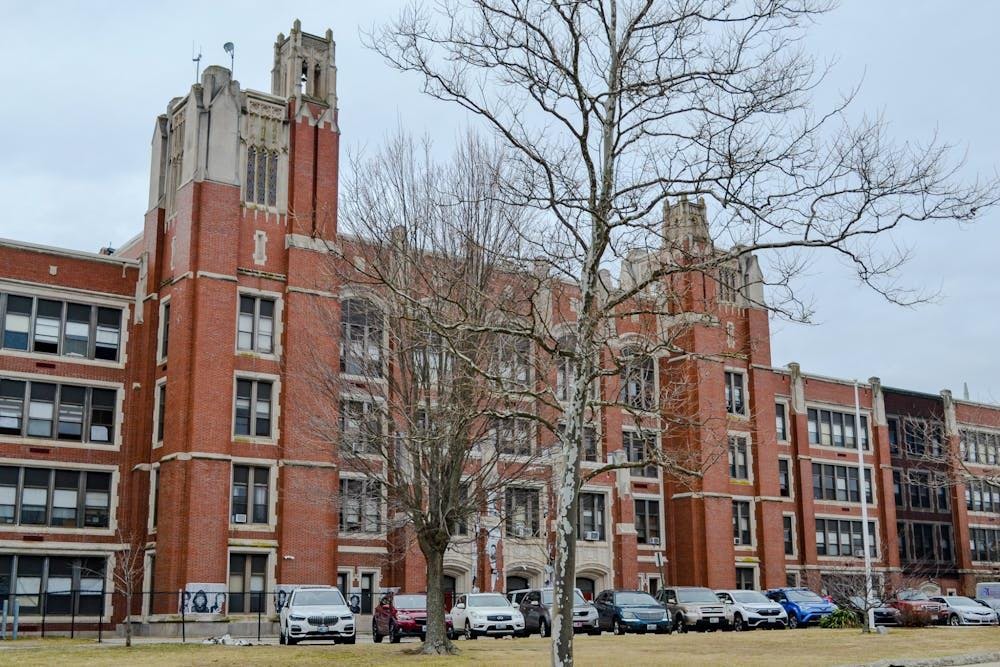This Wednesday, the Providence Public School Board unanimously passed a resolution calling on the Providence Public School District and the Rhode Island Department of Education to halt the decision to close 360 High School and merge it under the Juanita Sanchez Educational Complex’s new Life Sciences Institute.
But PPSD, which is controlled by the state, still plans to restructure 360 by merging it into JSEC, according to PPSD spokesperson Jay Wegimont, who acknowledged the School Board’s advisory role in an email to The Herald.
The closure of 360 has been contested since it was announced on Feb. 6. The day after its announcement, students organized a walkout in opposition to the decision, The Herald previously reported. PPSD and RIDE meetings have been dominated by 360 community members seeking to keep their school open.
PPSD has been under state takeover since 2019. As a result, the School Board does not have decision-making authority regarding school closures. “Under the state intervention, the school board serves in an advisory capacity,” wrote RIDE’s Director of Communications Victor Morente in an email to The Herald.
Local representatives have also responded to the closure by proposing new legislation regulating school closure decisions and other issues of district decision-making.
School Board resolution
The School Board resolution called on RIDE and PPSD to halt the 360 closure decision and expressed concern about both “the lack of transparency” in the decision-making process and the disruption to student lives the closure may cause.
“The Providence School Board vehemently opposes the closure or merger of 360 High School and strongly urges the exploration of alternative measures to sustain its continued operation,” the resolution stated.
“We want transparency about the whole process,” said Christian Martinez, a 360 math teacher and PPSD graduate, in an interview with The Herald after the Feb. 27 RIDE meeting. “We want clarity, (and) we want answers (justifying the merger) that actually match with the real data.”
At the Wednesday meeting, Superintendent Javier Montañez reiterated that the decision to merge 360 under JSEC is final. Board Member Anjel Newmann responded by stating that “there’s still time to be responsive to our community.”
“PPSD leadership closely reviewed 360’s performance data and made a recommendation for the merger to the Commissioner of Education, who has the authority to effectuate the merger under the Crowley Act,” wrote RIDE spokesperson, in an email to The Herald.
Morente noted that the PPSD leadership who made the merger recommendation included Montañez and “his leadership team.”
Wegimont noted that the Juanita Sanchez Life Sciences Institute has extended 21 job offers to teachers, 15 of which were made to displaced 360 teachers. He added that “student placement from 360 High School is underway and so far, only 14 students have asked to be assigned” to a school other than JSEC.
District reasoning behind the closure
In his email to The Herald, Morente cited low performance and cost concerns as motives for the closure. He added that RIDE believes the new Juanita Sanchez Life Sciences Institute — which 360 is being merged into — “centered students’ needs and prioritized expanding access to innovative and engaging programming for in-demand, high-paying fields.”
“The restructuring proposes to answer calls from students for greater academic opportunity and more engaging programming that will set them up for success in college, career and beyond,” Morente wrote.
He noted that information regarding the closure was “leaked” before a scheduled session for teachers could occur. “The school principal was also aware that restructuring was a consideration,” he wrote.
According to Dr. Ellen Foley, a STEM learning facilitator at 360 and former associate director of the Annenberg Institute, 360 students were scheduled to take the current academic year’s proficiency exams in April. The scores of these exams would decide whether 360 could be moved out of one-star status, which is being used to justify the merger with JSEC, Foley said in an interview with The Herald.
Ryan Barker, a 360 social studies teacher, said at the Feb. 27 RIDE meeting that 360 is very close to moving up from one-star status. “It’s not like 360 is far from two-star status,” he said. “We need one or two students to demonstrate proficiency on the SAT to move up — what other school could claim such a narrow margin?”
The SAT determines a school’s achievement and growth rating and is only offered in English. 360 High School has the second-highest percentage of multilingual learners in the district, and community members have said this negatively impacts their star status. Morente did not respond to a specific request for comment about how RIDE accounts for high percentages of multilingual learners in proficiency rates.
Morente did not directly address why the district did not wait until after April to decide the future of 360. But, he emphasized that “360 High School has been identified for Comprehensive Support and Improvement (CSI) since 2019-2020, and did not meet the exit criteria for 2023-2024.”
The district has not determined exact staffing numbers for the newly merged school, The Herald previously reported. Morente wrote that “the District will continue to closely monitor its budget as it considers staffing.”
Foley told The Herald that it’s unclear how much money the merger will save. She added that 360’s per pupil expenditure is lower than the state average. The JSEC school that 360 is being merged with spends nearly double per student compared to 360.
“The District will realize $1.5-2 (million) in cost savings from the restructuring,” wrote Morente. He did not explain specifically where those savings are coming from.
Representatives respond with legislation
Rhode Island District 7 Representative David Morales introduced legislation that regulates the process behind school restructuring decisions. The legislation requires meetings with students and parents, public forums in large venues about closure or merger proposals, contingency plans for impacted staff and detailed transition planning for school buildings and displaced students.
Morales told The Herald that the legislation aims to ensure transparency throughout the decision-making process.
“You can’t just come in and say ‘We’re going to close your school at the end of the year,’” Morales said. “There has to be a process that is followed before it is ever made official.”
The legislation would be required for all school districts, including those under state takeover.
In the House Committee on Education’s March 13 meeting, Morales said that he was open to modifying the bill for districts that already engage the community in their decision-making processes.
At the meeting, several 360 community members attended to show their support for the bill. “The way (how) this all transpired was just wrong,” said Daisy Vega, a 360 school counselor, in a comment at the meeting. “It didn’t include any of us.”
School Board member Night Jean Muhingabo also expressed his support for the bill at the March 13 meeting. He addressed 360’s closure, alongside two elementary schools that closed in 2022 and a middle school that is being phased out.
“As a board member, I was surprised to learn about these closure plans on Twitter, and RIDE didn’t hold any meetings with the School Board,” Muhingabo said. “We need transparency.”
Morales also introduced legislation to make the student representative on the Council on Elementary and Secondary Education a voting member. “Having a voting member in the form of a student on the K-12 Council gives (them) an opportunity to further advocate, instead of being a passive listener,” he said.
Several community members voiced support for the bill at the March 6 House Committee on Education meeting.
“We believe as members of a democracy, students should be prepared to participate,” Dexter Vincent, Co-Director of the Leadership Team for the Providence Student Union and a senior at Classical High School, said at the meeting. “I urge the committee members to pass this bill.” R.I. Kids Count also expressed support for the bill.
Morente did not respond to a request for comment about whether RIDE would support either piece of legislation.

Ciara Meyer is the managing editor of newsroom and vice president of the 136th Editorial Board. She is from Saratoga Springs, New York and plans on concentrating in Statistics and English Nonfiction. In her free time, she loves scrapbooking and building lego flowers.





